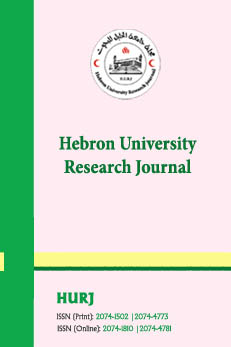News Archive
Hebron University organized International Conference on the Membership of Palestine in the United Na
Hebron, 19 April 2012—Hebron University’s Legal Clinic organized an international conference on the Legal and Political Implications of the Membership of Palestine, as a State, in the United Nations on 18 and 19 April 2012. Twenty-six papers were presented at the conference which included law, political science, history and economy professors from Palestinian universities (Hebron, Istiqlal, Al-Quds, Birzeit, Al-Azhar, Al-Najah), and international universities (Oxford, Ohio, Geneva, George Town, Florida, London, and American University Washington DC) in addition to a number of Palestinian officials and independent experts. The papers, a number of which would be published in a collective book that would be edited by the President of the conference Dr. Mutaz M. Qafisheh, presented substantive recommendations to Palestinian policy-makers to support their efforts while seeking the membership of the UN and its specialized agencies.
The conference, which was attended by hundreds of people from various countries representing ministers, ambassadors, UN officials, governmental officials, judges, lawyers, professors, independent experts, and students, urged the PLO to continue its efforts to seek full membership in the UN by re-application to the Security Council or direct application to the UN General Assembly to acquire either full membership based on the Assembly’s specific power to determine the status of mandated territories or by applying to the position of non-member State, regardless of the level of progress in the negotiations process, as membership in the UN stems from the Palestinian people’s right to self-determination, sovereignty and statehood. It called for speeding up of the Palestinian reconciliation, implement the Doha Agreement between the biggest political parties as soon as possible, and form a transitional government of Palestinian experts to make legislative and presidential elections, and approach the UN in a unified position.
A call has been made on strengthening the role of the PLO by equipping it with new young generation, hold elections for the Palestinian National Council in Palestine and abroad and give the chance to all Palestinians wherever they are to register, participate in the election and be represented. In addition, the expects attending the conference asked the PLO to grant all Palestinians, wherever they are identity papers to confirm their Palestinian nationality, such as passports or identity cards or certificates of citizenship, through the adoption of a law on Palestinian nationality and to give the right of citizenship for each person belonging to historical Palestine whether born to a Palestinian father or a Palestinian mother. The conference urged the international community to activate the popular resistance by peaceful means as a strategic goal to achieve full Palestinian independence, through, for example, taking advantage of international law and applying to the membership of international organizations and courts, improving media strategy, encouraging the movements of solidarity with Palestinian people, and learn from other States that had been liberated peacefully, especially the experience of Namibia and India.
The conference focused on the question of Palestinian prisoners, whose situation affects hundreds of thousands of Palestinian families, and asked for exploring the possibility for Palestine to become a member to Geneva Convention III in order to take advantage of the mechanisms accorded by this Convention to protect prisoners of war.
Despite the rejection of Palestinian request by the Prosecutor of the International Criminal Court to investigate Israeli crimes, the conference asked Palestine to retry to join the Rome Statute of the International Criminal Court by approaching the General Assembly to request the Court to accept Palestine as a member or through the assembly of States Parties to the Rome Statute for the admission of Palestine to the membership of the Court. In addition, the conference called upon Palestine to immediately reify the International Covenant on Civil and Political Rights, International Covenant on Economic, Social and Cultural Rights, and the International Convention Against all Forms of Racial Discrimination, as Palestine meets the conditions of becoming a party to these treaties after becoming a member of UNESCO. It requested the Palestinian Authority to modify domestic Palestinian legislation and institutional practices to ensure Palestinian compliance with the provisions of these treaties at the local level. Moreover, Palestine should not hesitate to ratify other available international treaties, such as treaties on the protection of cultural heritage, diplomatic and consular relations, Law of the Sea, humanitarian law, refugees, apartheid, and the environment.
Palestine, the conference recommended, should also apply for the membership of other international organizations and other agencies of the UN, such as World Trade Organization, International Labor Organization, World Bank, International Monetary Fund, World Health Organization, Food and Agriculture Organization, as the membership in these organizations is an indication on the existence of the State of Palestine, and might be regarded as a step toward full UN membership. To this end, Palestine should reform the Palestinian diplomatic staff through the development of unified rules for all embassies and consulates and diplomatic missions, and improve the performance of the Ministry of Foreign Affairs by supplying it with trained staff able to provide protection for Palestinians abroad and to represent Palestine professionally.
Finally, the conference invited scholars in Palestine and abroad to conduct in-depth scientific research, especially in the areas of international water law, settlements, Jerusalem, human rights, refugees, prisoners of war, humanitarian law, international criminal law in relation to Palestine, and the Palestinian legal system, and urged Palestinian universities to initiate more specialized international law programs and refereed law journals.





